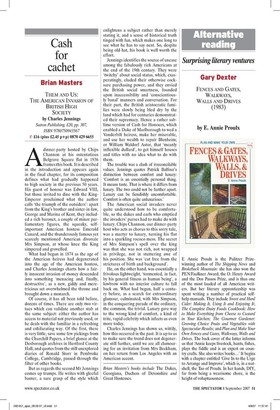Cash for cachet
Brian Masters THEM AND US: THE AMERICAN INVASION OF BRITISH HIGH SOCIETY by Charles Jennings Sutton Publishing, £20, pp. 307, ISBN 9780750943567 £16 (plus £2.45 p +p) 0870 429 6655 Adinner-party hosted by Chips Channon at his ostentatious Belgrave Square flat in 1936 frames this book. It is described in the introduction and appears again in the final chapter, for its composition defines what had gradually happened to high society in the previous 50 years. His guest of honour was Edward VIII, but those invited to dine with the KingEmperor proclaimed what the author calls 'the triumph of the outsiders': apart from the King's brother and sister-in-law, George and Marina of Kent, they included a rich baronet, a couple of minor parliamentary figures, the squeaky, selfimportant American hostess Emerald Cunard, and the thunderously famous yet scarcely mentioned American divorcée Mrs Simpson, at whose knee the King simpered and grovelled.
What had begun in 1874 as the age of the American heiress had degenerated into the age of the American hostess, and Charles Jennings charts how a fairly innocent invasion of money descended into something 'menacing and, finally, destructive', as a new, giddy and meretricious set overwhelmed the throne and brought down a monarch.
Of course, it has all been told before, dozens of times. There are only two virtues which can validate another stab at the same subject: either the author has access to material not previously used, or he deals with the familiar in a refreshing and exhilarating way. Of the first, there is very little, save some few pickings from the Churchill Papers, a brief glance at the Desborough archives in Hertford County Hall, and quotes from the still unexplored diaries of Ronald Storr in Pembroke College, Cambridge, passed through the filter of other books.
But as regards the second Mr Jennings comes up trumps. He writes with gleeful banter, a sure grasp of the style which enlightens a subject rather than merely stating it, and a sense of historical truth tinged with fun, which makes one long to see what he has to say next. So, despite being old hat, his book is well worth the effort.
Jennings identifies the source of unease among the fabulously rich Americans at the end of the 19th century. They were 'twitchy' about social status, which, exasperatingly, eluded their otherwise cocksure purchasing power, and they envied the British social smartness, founded upon inaccessibility and 'conscientiously banal' manners and conversation. For their part, the British aristocratic families were slowly being bled dry by the land which had for centuries demonstrated their supremacy. Hence a rather sublime version of Cash for Honours, which enabled a Duke of Marlborough to wed a Vanderbilt heiress, make her miserable, and use her wealth to repair Blenheim; or William Waldorf Astor, that 'meanly inflexible dullard', to get himself houses and titles with no idea what to do with them.
The trouble was a clash of irreconcilable values. Jennings quotes Patrick Balfour's distinction between comfort and luxury: 'Comfort is an essentially personal thing. It means taste. That is where it differs from luxury. The two could not be further apart. Luxury can be fiendishly uncomfortable. Comfort is often quite unluxurious.'
The American social invaders never quite understood how to be comfortable, so the dukes and earls who emptied the invaders' purses had to make do with luxury. Chips Channon, our dinner-party host who acts as chorus to this sorry tale, was a martyr to luxury, turning his flat into a sparkling rococo mess. The secret of Mrs Simpson's spell over the king was that she was not rich, not wrapped in privilege, not in stuttering awe of his position. She was 'cut free from the strictures of birth and background'.
He, on the other hand, was essentially a frivolous lightweight, 'tormented, in fact, by his general fitness as human being', a lowbrow with no interior culture to fall back on. What had begun, half a century before, as a search for extraordinary glamour, culminated, with Mrs Simpson, in the conquering parade of the ordinary, the common, the trivial. Luxury gave way to the wrong kind of comfort, a kind of trite, vapid celebrity which infects us even more today.
Charles Jennings has shown us, wittily, how this occurred in the past. It is up to us to make sure the trend does not degenerate still further, until we are all clamouring for an invitation from Mrs Beckham, on her return from Los Angeles with an American accent.
Brian Masters's books include The Dukes, Georgiana, Duchess of Devonshire and Great Hostesses.



































































 Previous page
Previous page